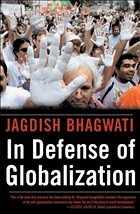Nicht lieferbar

In Defense of Globalization
Versandkostenfrei!
Nicht lieferbar
Weitere Ausgaben:
Paperback edition; one of the world's leading economists today, challenges the claims of those who argue that globalization is responsible for much of the poverty, inequality, and other social ills that persists throughout the world. On the contrary, Bhagwati argues that anti-globalizer have overlooked or failed to see the many beneficial effects which have resulted from globalization.The riot-torn meeting of the World Trade Organization in Seattle in 1999 was only the most dramatic sign of the intensely passionate debate now raging over globalization, which critics blame for everything from c...
Paperback edition; one of the world's leading economists today, challenges the claims of those who argue that globalization is responsible for much of the poverty, inequality, and other social ills that persists throughout the world. On the contrary, Bhagwati argues that anti-globalizer have overlooked or failed to see the many beneficial effects which have resulted from globalization.
The riot-torn meeting of the World Trade Organization in Seattle in 1999 was only the most dramatic sign of the intensely passionate debate now raging over globalization, which critics blame for everything from child labor to environmental degradation, cultural homogenization, and a host of other ills afflicting poorer nations. Now Jagdish Bhagwati, the internationally renowned economist known equally for the clarity of his arguments and the sharpness of his pen, takes on the critics, revealing that globalization, when properly governed, is in fact the most powerful force for social good in the world today.
Drawing on his unparalleled knowledge of international and development economics, Bhagwati explains why the "gotcha" examples of the critics are often not as they seem, and that in fact globalization often alleviates many of the problems for which it has been blamed. For example, the author describes how globalization helps the cause of women around the world, how poverty in the poor countries and child labor are reduced by globalization, and how the mixing of world cultures can lead to new artistic and cultural highs, rather than creating a homogeneous "McWorld".
With the wit and wisdom for which he is renowned, Bhagwati convincingly shows that globalization is part of the solution, not part of the problem. Anyone who wants to understand what's at stake in the globalization wars must read In Defense of Globalization.
The riot-torn meeting of the World Trade Organization in Seattle in 1999 was only the most dramatic sign of the intensely passionate debate now raging over globalization, which critics blame for everything from child labor to environmental degradation, cultural homogenization, and a host of other ills afflicting poorer nations. Now Jagdish Bhagwati, the internationally renowned economist known equally for the clarity of his arguments and the sharpness of his pen, takes on the critics, revealing that globalization, when properly governed, is in fact the most powerful force for social good in the world today.
Drawing on his unparalleled knowledge of international and development economics, Bhagwati explains why the "gotcha" examples of the critics are often not as they seem, and that in fact globalization often alleviates many of the problems for which it has been blamed. For example, the author describes how globalization helps the cause of women around the world, how poverty in the poor countries and child labor are reduced by globalization, and how the mixing of world cultures can lead to new artistic and cultural highs, rather than creating a homogeneous "McWorld".
With the wit and wisdom for which he is renowned, Bhagwati convincingly shows that globalization is part of the solution, not part of the problem. Anyone who wants to understand what's at stake in the globalization wars must read In Defense of Globalization.




